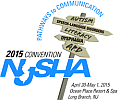Specific Social Skills Parents Deem Important for Children With Autism
Thursday, 11:00am to 1:00pm
Seabright
Poster 1
Social skills deficits in children ranging from elementary through high school were examined to determine relative importance in children of three different age groups based on the perceptions of the children's parents. The participants were parents of children who receive special services in school. Five parents completed the study, zero from the preschool group, one from the elementary school age group and four from the middle school and high school age group. Parents ranked each social skill using a Likert Scale based on how important/unimportant it was to improve that behavior.
The results revealed that the overall averages of each social skill did not justify any significant differences among the social skills deficits of each age group, however when individual skills were examined further, the deficits relating to conversational skills were important to both groups and tended to be more important for parents of children in the middle school and high school age group who rated these skills as extremely important in contrast with the parents of the elementary school group who rated them as important. All of the parent(s) in both groups reported that their children have had opportunities to generalize social skills learned at home and in the community.
The results of the study indicated that those social skills deficits deemed to be most important to parents of elementary school children and the middle school and beyond group revolve around conversational skills. Parents of the elementary school group gave many of these skills a rating of important and parents of the middle school and beyond group rated many of them as extremely important. With the rise of autism and increased need for social skills training programs, continued and extensive research in this area is warranted.
Track:
Pediatric
